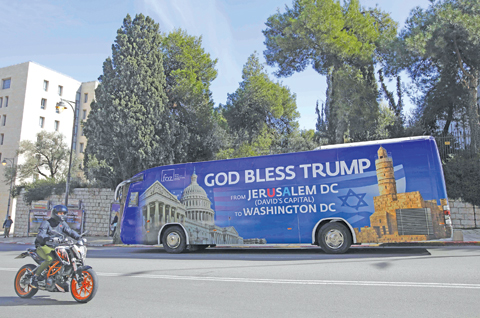JERUSALEM: Near the olive grove where Christians believe Jesus agonized before his crucifixion, an American visitor spoke of a decision by US President Donald Trump some believe also holds spiritual importance. Phillip Dunn, the 37-year-old pastor of an evangelical Christian church in the US state of South Carolina, said he saw Trump's declaration of Jerusalem as Israel's capital last month as part of biblical prophecy. "Certainly this holds a lot of significance for people in that way. We believe Christ is going to return," Dunn, part of a group of around 50 American Southern Baptists visiting Jerusalem holy sites over the weekend, said before climbing back aboard a tour bus.
Trump's controversial declaration on December 6 will be back in the spotlight over the coming days with Vice President Mike Pence arriving Sunday night for talks with Israeli officials in Jerusalem. Dunn and his fellow believers are key backers of Trump's move in the United States and part of the Christian evangelical community there that has become an important pillar of support for his Republican party. Pence, who stood behind Trump as he made his Jerusalem announcement, is himself an evangelical Christian.
Dunn and others on the Jerusalem tour, planned before Trump's announcement, said they were pleased with his declaration because they consider it important to support Israel and affirm its claim that the entire city is its capital. But there were also otherworldly considerations among the group. Some evangelicals believe, based on interpretations of scripture, that firmly establishing Jerusalem as Israel's capital and establishing a new temple there could help lead to the second coming of Jesus. Dunn and others on the trip said interpretations of Jerusalem's place in biblical prophecy vary too widely to provide a simple answer such as that one.
'A lot of mystery'
Brett Burleson, a pastor at a church in Alabama, said "there's a lot of mystery to that, so I don't claim to know how it's all going to play out". "We do recognize that this is a place where we believe the Lord Jesus himself will return and bring a peaceful end to human history," the 47-year-old said. Jerusalem's status is perhaps the most sensitive issue in the decades-old Israeli-Palestinian conflict.
Israel occupied and later annexed its eastern sector in the Six-Day War of 1967 in a move never recognized by the international community. It sees the entire city as its capital, while the Palestinians view east Jerusalem as the capital of their future state. Trump's declaration deeply angered the Palestinians, with president Mahmud Abbas cancelling plans to meet Pence during his visit, which had been set for late December before being postponed.
The declaration was partly the result of a long political debate in the United States, with a law passed calling for the embassy to be moved from Tel Aviv to Jerusalem in 1995. It however allowed presidents to sign a waiver every six months to prevent the embassy move for national security reasons. Trump again signed the waiver when declaring Jerusalem Israel's capital last month, but stressed he intended to move the embassy. He also said Jerusalem's final borders and status would have to be negotiated, but Palestinians were unconvinced.
'Probably not'
David Parsons, vice president of the International Christian Embassy based in Jerusalem, said he helped draft an earlier version of the embassy legislation while working for a pro-Israel lobbying firm in the United States. "We have a large, broad movement worldwide that supports Israel on various motivations," Parsons said of the primarily evangelical Christian embassy.
"Some are motivated by biblical prophecy, but there's a broad array of views on biblical prophecy." Zalman Shoval, a former Israeli ambassador to the United States, said Sunday that Israel has long reached out to US Christian groups for support. Specifically mentioning evangelicals, Shoval said "we may not agree with everything anybody says about the future of Israel or the future of the country." Some evangelicals believe Jews would eventually have to convert to Christianity.
"But we must look at the present situation," he told journalists. "The present situation is that there is a very important body of people in America who believe-honestly and genuinely believe-in the future of the Jewish people and its place in the Jewish country in Israel." Lewis Richerson, 37, a pastor from Louisiana on the Jerusalem tour, may be among those he had in mind. His support for Trump's declaration was "primarily political" since backing Israel in part helps "promote democracy and freedom around the world." Richerson said of the declaration: "Is that some type of biblical prophecy? Probably not."_ AFP



